
Poetic Justice
Ruth Bader Ginsburg spends day on campus, tackles The Merchant of Venice at round-table discussion
As it turns out, United States Supreme Court Justice Ruth Bader Ginsburg is not only a constitutional law scholar, she’s also a well-versed student of Shakespeare.
At a round-table discussion of The Merchant of Venice at Montclair State on September 23, Ginsburg talked about Shakespeare’s controversial play – including the issues of law, anti-Semitism, assimilation and conversion in the play.
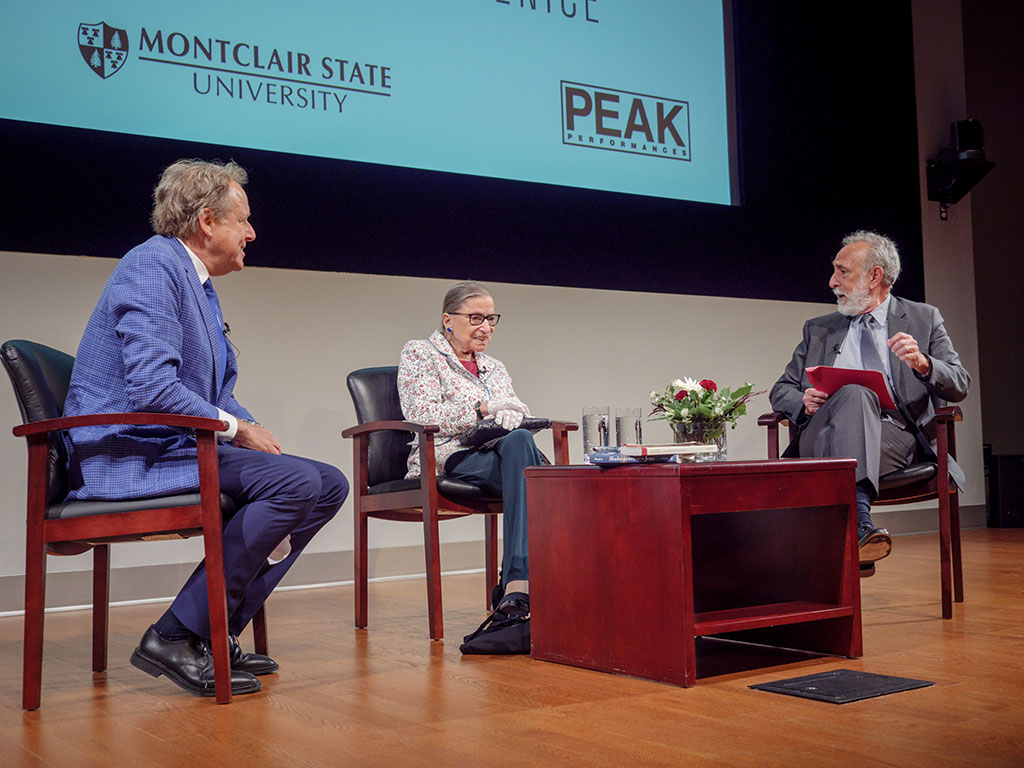
Ginsburg, whose grandson appeared in the Peak Performances production of Merchant at the Kasser Theater, joined renowned scholars David Scott Kastan of Yale University and James Shapiro of Columbia University in a conversation prior to the performance.
In addition to having studied Shakespeare in school, Ginsburg has performed various roles with the Shakespeare Theater Company in Washington, D.C., which, she said, invites the Supreme Court of the United States justices to play “bit parts for lawyer’s night.”
“In Henry VI, I was ‘Dick the Butcher’ who has the famous line, ‘First thing we do, let’s kill all the lawyers,’ and I then have to explain that was not meant as a put-down of lawyers. It takes place during The Jack Cade Rebellion. Jack Cade is an anarchist. And you need the law to save the society from chaos.”
In introducing the panel, Montclair State English Professor Naomi Liebler lauded Peak Performances’ unique and updated production as a thought-provoking piece for the current political climate.
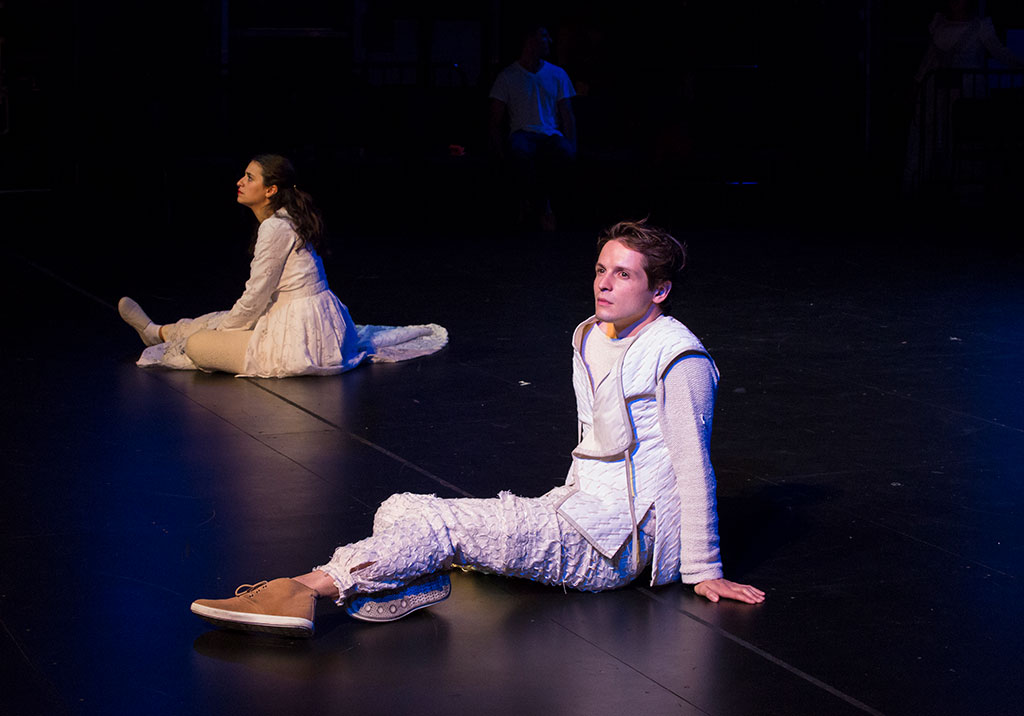
“In all the ways that really matter, this perfect combination, this perfect brainstorm, is not at all surprising with its collection of ‘others’ in a place suspicious of and yet dependent on them for survival,” said Liebler. “Merchant is the right play for us…not only because it vibrates with national and global issues but also because it speaks to this University’s own embrace of diversity. It’s a stroke of good luck we should have all of this right here, right now.”
That good luck extended to the fact that Ginsburg’s grandson, Paul Spera, was performing the role of Lorenzo in the Peak Performances production, giving the University the perfect opportunity to include the justice in the round-table conversation.
The production, directed by Karin Coonrod and performed by the Compagnia de Colombari, addresses the notion of “otherness” by having the Jewish moneylender Shylock performed by five actors of different races, ethnicities and even gender. In 2016, Coonrod premiered this production in the Jewish ghetto of Venice, its original setting. According to the program, Coonrod says, “Now we are in the New World after a shattering and divisive election that challenges our aspirations. The play calls us to witness the stranger in our midst and feel the extremities of rage inside our shared humanity.”
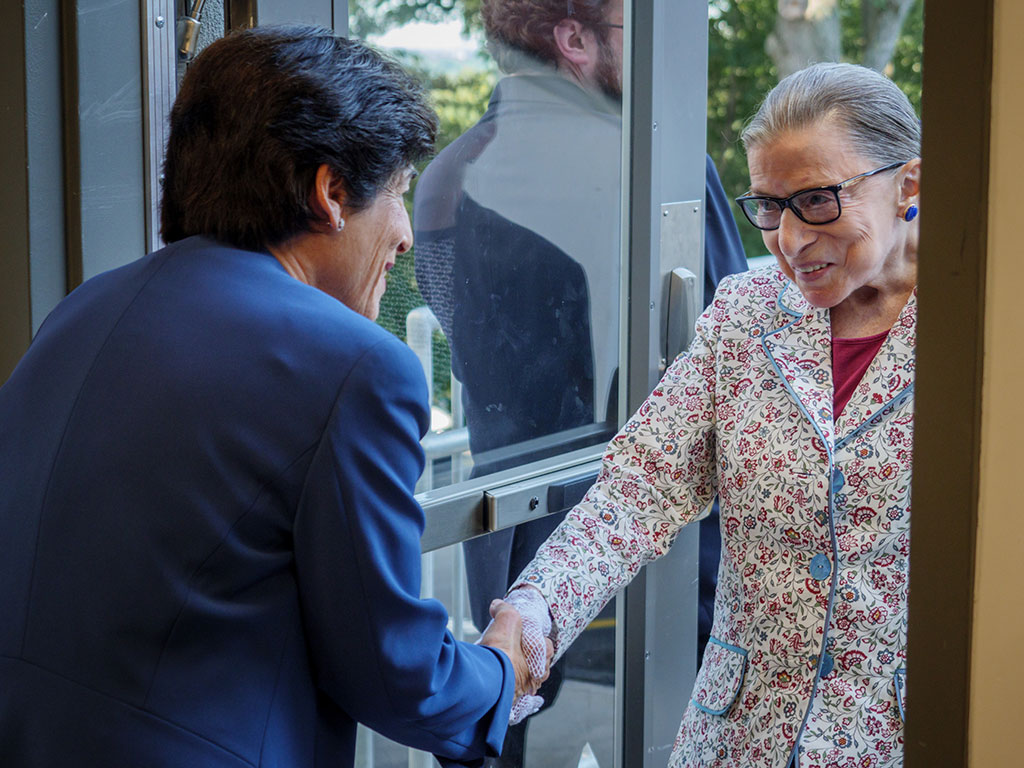
The conversation took place in the new School of Communication and Media building’s 187-seat Presentation Hall, with the professors wearing suits and ties and the justice sporting a brocade jacket and white crocheted gloves. When asked about her earliest exposure to Shakespeare, Ginsburg responded that her first experience was, coincidentally, The Merchant of Venice, but it was not on stage because it had been banned from public schools in New York.
“So, then I decided to read the play,” said Ginsburg, who grew up in Brooklyn. “And, of course, Shylock’s famous speech, ‘Hath not a Jew eyes’ and Portia’s speech ‘the quality of mercy is not strained.’ It also occurred to me that these are two wonderful speeches but neither character is likable. There isn’t an emergent hero or heroine. They’re all flawed people.”
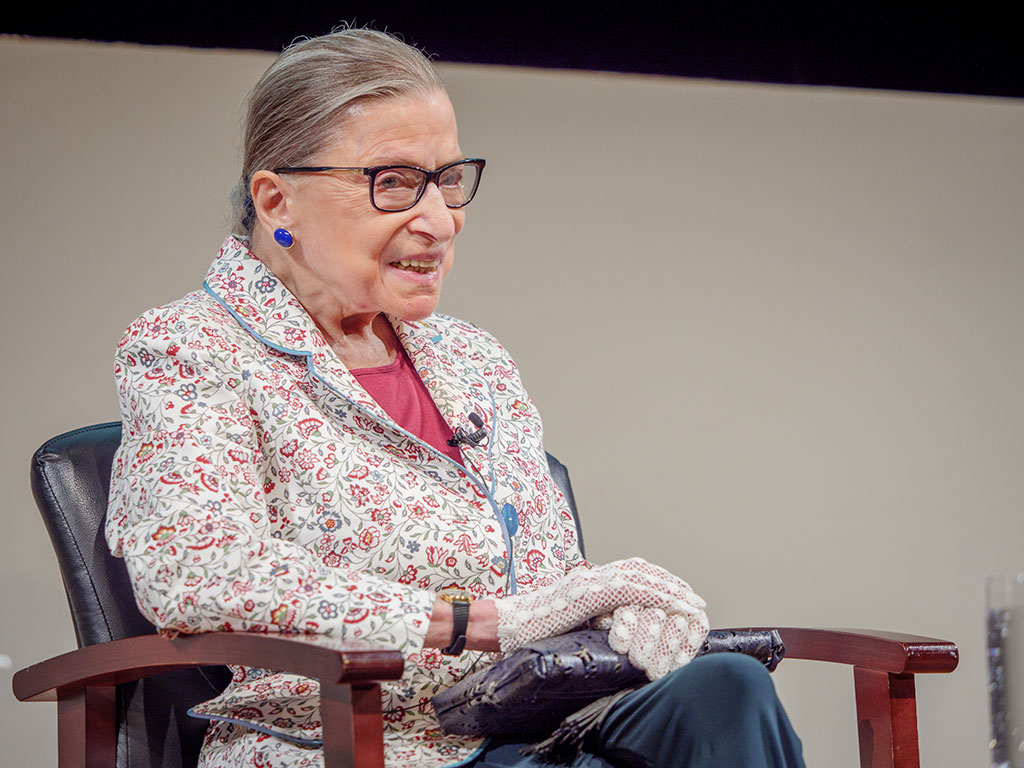
Kastan and Shapiro – each authors of several books on Shakespeare – and Ginsburg discussed specific scenes and nuances of Merchant and whether the play is anti-Semitic because of its negative portrayal of Shylock, who is considered alien or “the other.” Ginsburg pointed out that the female lead, Portia, who disguises herself as a lawyer-judge to pronounce judgment against Shylock, is conniving and hypocritical.
“In a way, she should have understood that status,” Ginsburg said. “Portia is a woman pretending to be a man pretending to be a lawyer-judge at a time when she could not be a lawyer or a judge, so in a sense she is an outsider, too. That’s why it’s remarkable that she could do this to Shylock.”
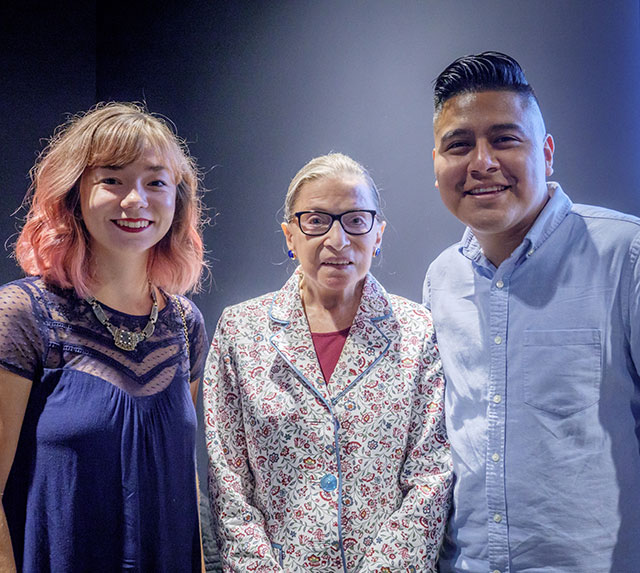
With its court scene, Merchant also gave Ginsburg a chance to discuss the play in legal terms. The courtroom scene is surprising, she said, because it starts as a civil case brought by Shylock and turns into a criminal case against him during the hearing – something unheard of in the legal world, even though through his plays, Shakespeare appears to have known a lot about the law.
“Shylock was denied due process,” she said. “The first thing, as someone suspected of criminal activity, he has a right to notice of what the charges are and to defend against them.”
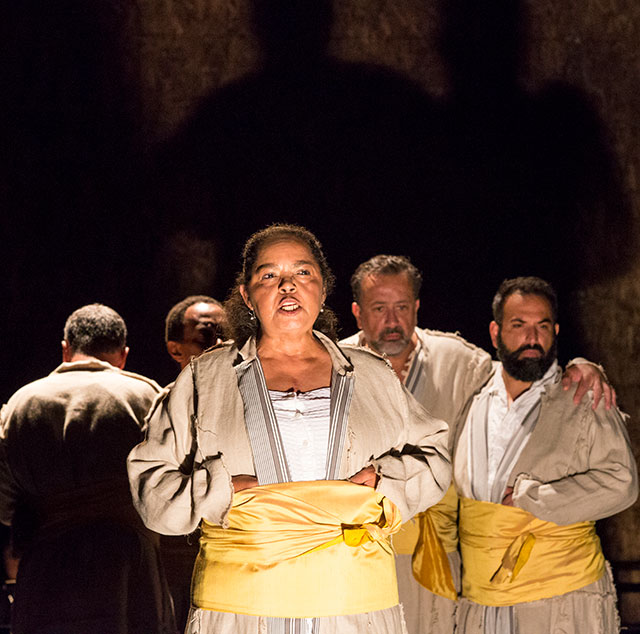
In the week leading up to the round table, the University community was abuzz about Ginsburg’s visit to campus, and the conversation was attended by faculty, staff, students and invited guests, including New Jersey Senator Lorretta Weinberg, State Supreme Court Justice Stuart Rabner ’11 HON, and Ginsburg’s daughter and grandson.
“When a person of important and substantial achievement visits the University, it offers an opportunity to provide our students with a model of what one can make of a life,” says Montclair State President Susan A. Cole.
Ginsburg’s visit, she says, “makes real…a person who is the second woman to be appointed to the U.S. Supreme Court, an accomplished American jurist, an advocate for women’s rights and an example of the uses of education, all wrapped up within the context of a grandmother proud of her grandson and defying the prejudices we have about age in our society.”
“It also occurred to me that these are two wonderful speeches but neither character is likable. There isn’t an emergent hero or heroine. They’re all flawed people.”
Two recent Montclair State graduates, who were English majors, had the opportunity to ask questions of the panel. Gustavo Vasquez and Allison Gormley asked questions about assimilation and conversion, and resistance to both, that impressed the panel.
“The questions confirm just what a great job Montclair State is doing,” said Shapiro of Columbia University.
Afterward, the former students were among only a handful of audience members who got to have their picture taken with Justice Ginsburg.
“It was humbling to get the opportunity to ask her a question,” says Vasquez, who majored in English and teaching. “It was a surreal experience, really. I feel like, ‘Did that just happen?’”
Gormley, who just started teaching eighth-grade English, says, “There are no words to describe the experience. Justice Ginsburg is a powerful female that I look up to. It was a little overwhelming.”